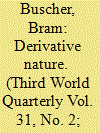| Srl | Item |
| 1 |
ID:
091558


|
|
|
|
|
| Publication |
2009.
|
| Summary/Abstract |
The South African energy debate is and will remain a heated one. Given South Africa's history of racial inequality and contemporary concerns around sustainability, much of it rightly focuses on the links between energy, poverty and the environment. Yet, many contributions to the (mainstream) debate seem to have a somewhat one-sided focus that might hamper rather than stimulate the understanding of these links. They either display a strong technical, quantitative bias and/or lean towards rather simplistic ideas about policy processes and dynamics. The article argues that many of these analyses could benefit greatly from a critical focus on the political economy of energy: the political-economic power structures that influence both many energy policies and the issues of energy equality and sustainability. Two major global developments emphasise the importance of this focus: the recent financial crisis and South Africa's role in the increasingly tense geopolitics of energy in Africa. The article concludes with some suggestions on how currently disparate political economies of energy could be better connected.
|
|
|
|
|
|
|
|
|
|
|
|
|
|
|
|
| 2 |
ID:
095058


|
|
|
|
|
| Publication |
2010.
|
| Summary/Abstract |
Many conservationists nowadays talk about the urgent need to value nature. To bring out the 'true value' of nature and make conservation compatible with poverty reduction, so the argument goes, it must be appropriated into the realm of commodities and priced in monetary terms. By employing the concept of 'derivative nature', this paper explores the consequences of this neoliberal move. Derivatives are financial mechanisms whose monetary value is literally derived from the value of underlying assets. They were originally devised to reduce risk in the marketplace, but have actually made the global financial market immensely more complex and created more systemic risk and uncertainty because of their susceptibility to speculation. The paper suggests that similar processes can be seen in the arena of conservation. It argues that both nature and 'the poor' are increasingly becoming 'underlying assets' for what has become the 'real' source of value of neoliberal conservation, namely images and symbols within the realms of branding, public relations and marketing. Empirically grounded in a discussion on transfrontier conservation in Southern Africa in the run-up to the 2010 soccer World Cup, the paper examines the consequences of 'derivative nature' and calls for critical thinking to start facing these consequences.
|
|
|
|
|
|
|
|
|
|
|
|
|
|
|
|
| 3 |
ID:
145182


|
|
|
|
|
| Summary/Abstract |
Over a thousand rhinos were killed in 2013 and 2014 as the poaching crisis in Southern Africa reached massive proportions, with major consequences for conservation and other political dynamics in the region. The article documents these dynamics in the context of the ongoing development and establishment of “peace parks”: large conservation areas that cross international state boundaries. The rhino-poaching crisis has affected peace parks in the region, especially the flagship Great Limpopo Transfrontier Park between South Africa, Mozambique and Zimbabwe. In order to save both peace parks and rhinos, key actors such as the South African government, the Peace Parks Foundation, and the general public responded to the poaching crisis with increasingly desperate measures, including the deployment of a variety of violent tactics and instruments. The article critically examines these methods of ‘green violence’ and places them within the broader historical and contemporary contexts of violence in the region and in the Great Limpopo Transfrontier Park. It concludes that attempting to save peace parks through ‘green violence’ represents a contradiction, but that this contradiction is no longer recognized as such, given the historical positioning of peace parks in the region and popular discourses of placing poachers in a ‘space of exception’.
|
|
|
|
|
|
|
|
|
|
|
|
|
|
|
|